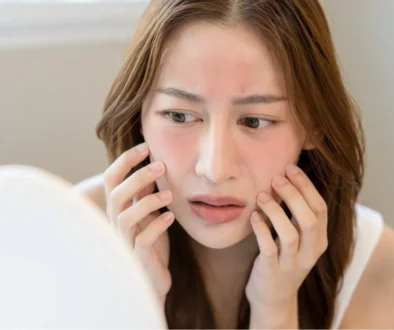Vitamin D Deficiency in Dubai: Signs You Shouldn’t Ignore
A large number of people believe that sunny places like Dubai ensure healthy vitamin D levels, but the truth is very different. Although the sun is present almost year-round, vitamin D insufficiency is prevalent and can cause a variety of ailments if not treated. Understanding the signs of low vitamin D, why deficiency happens, and how to correct it is key to protecting your long-term health.
At Lifeline Clinic Dubai, we regularly see patients who feel tired, weak, or unwell without knowing that the underlying reason is low vitamin D levels. By learning what to look out for, you can take steps early and avoid complications.
Why Vitamin D Matters
Vitamin D is sometimes referred to as the “sunshine vitamin” since your body creates it when exposed to sunlight. It’s essential for muscle health, bone strength, immune function, and regulating mood. A deficit in vitamin D can show in various places on the body, which is why it is commonly described as a “silent deficiency.”
In Dubai, many individuals spend most of their time indoors, wear sunscreen daily, and avoid direct sunlight during the warmest hours of the day. Cultural clothing and lifestyle habits also reduce sun exposure, which explains why deficiency is widespread even in a sunny climate.

Signs of Low Vitamin D You Shouldn’t Ignore
Low vitamin D symptoms can be subtle at first. Many people do not realise they have a problem until the signs become more noticeable. Common indicators include:
- Constant exhaustion and low energy – Feeling weary all the time, even after adequate rest, might be a significant indicator of a shortage.
- Bone pain and muscle weakness – Vitamin D helps regulate calcium. Without enough of it, bones and muscles lose strength.
- Frequent illnesses – Vitamin D supports your immune system. Repeated colds, flu, or infections may signal low levels.
- Mood changes and depression – Low vitamin D is linked to low mood, irritability, and in some cases, depression.
- Slow wound healing – Cuts or injuries that take longer than usual to heal may point to low vitamin D.
- Hair loss – A severe deficiency has been linked to hair thinning and increased hair fall.
If you notice these symptoms together, it is essential to consider vitamin D deficiency as a possible cause.
Causes of Vitamin D Deficiency in Dubai
While sun exposure is the most natural source of vitamin D, there are several reasons people in Dubai develop deficiencies:
- Spending most hours indoors, especially in air-conditioned offices or homes.
- Covering most of the skin with clothing and limiting direct sunlight are essential measures.
- Using high-SPF sunscreen daily, which blocks UV rays necessary for vitamin D production.
- Darker skin tones require more sun exposure than lighter skin to synthesise the same quantity of vitamin D.
- Limit your intake of vitamin D-rich foods such as fatty fish, eggs, and fortified dairy.

Health Risks of Untreated Deficiency
Ignoring symptoms of vitamin D deficiency in the future could lead to more serious health consequences. Long periods of deficiency can lead to an increased risk of osteoporosis, an increase in fractures, weakness of muscles, and chronic fatigue. It has also been linked to high blood pressure, diabetes, cardiovascular disease, and certain autoimmune disorders. For children, deficiency can result in rickets, a condition where bones become soft and deformed.
How Vitamin D Deficiency Is Diagnosed
The only way to confirm low vitamin D levels is through a blood test. At Lifeline Clinic Dubai, we provide vitamin D testing to measure your levels accurately. Based on the results, our doctors can advise whether lifestyle changes, supplements, or medical treatment are needed.
Treating and Preventing Vitamin D Deficiency
The severity of the insufficiency determines the appropriate treatment. For mild cases, lifestyle adjustments may be sufficient. These can include:
- Spending short, safe periods of time in the sun, particularly early morning or late afternoon.
- Eat vitamin D-rich foods like salmon, tuna, egg yolks, and fortified cereals or milk.
- Taking over-the-counter supplements in recommended doses.
For a more significant deficiency, doctors may prescribe higher doses of vitamin D tablets or injections. Professional guidance is essential, since taking too much vitamin D can also cause health issues.

Living Well with Healthy Vitamin D Levels
The good news is that vitamin D insufficiency can be prevented and treated. By paying attention to the early signs of low vitamin D, getting tested, and following medical advice, you can restore healthy levels and avoid long-term complications.
At Lifeline Clinic Dubai, our team of specialists supports patients with diagnosis, guidance, and treatment plans tailored to individual needs. No one should suffer unnecessarily from a deficiency that can be easily corrected.
When to See a Doctor
If you experience constant fatigue, unexplained body pain, frequent illness, or any of the low vitamin D symptoms listed above, it is time to seek medical help. Early detection can make a massive difference to your health and quality of life.
Take the First Step Today
Vitamin D deficiency is more common in Dubai than most people think, but you do not need to live with it. Book your check-up at Lifeline Clinic Dubai today and get a clear picture of your vitamin D levels. With prompt treatment, you can regain energy, build your body, and protect your long-term health.




